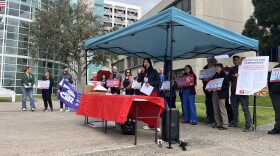U.S. regulators and 17 states sued Amazon on Tuesday in a pivotal case that could prove existential for the retail giant.
In the sweeping antitrust lawsuit, the Federal Trade Commission and a bipartisan group of state attorneys general paint Amazon as a monopolist that suffocates competitors and raises costs for both sellers and shoppers.
The FTC, tasked with protecting U.S. consumers and market competition, argues that Amazon punishes sellers for offering lower prices elsewhere on the internet and pressures them into paying for Amazon's delivery network.
"Amazon is a monopolist and it is exploiting its monopolies in ways that leave shoppers and sellers paying more for worse service," FTC Chair Lina Khan told reporters on Tuesday.
"In a competitive world, a monopoly hiking prices and degrading service would create an opening for rivals and potential rivals to ... grow and compete," she said. "But Amazon's unlawful monopolistic strategy has closed off that possibility, and the public is paying dearly as a result."
Amazon, in a statement, argued that the FTC's lawsuit "radically departed" from the agency's mission to protect consumers, going after business practices that, in fact, spurred competition and gave shoppers and sellers more and better options.
"If the FTC gets its way," Amazon General Counsel David Zapolsky wrote in a post, "the result would be fewer products to choose from, higher prices, slower deliveries for consumers, and reduced options for small businesses—the opposite of what antitrust law is designed to do."
Broadly, Tuesday's case escalates a long-running criticism of Amazon: It both owns the online platform that many sellers use to reach shoppers, and it sells products on that very same platform. What's more, it owns the shipping and delivery network that everyone on the platform is incentivized to use.
Around 60% of items purchased on Amazon are sold by third-party sellers, company executives have said. The FTC says Amazon's fees are so high that sellers effectively keep only half of what they make on the platform.
The federal lawsuit did not immediately seek a breakup of the retail giant. Instead, the FTC and states are asking the court for a permanent injunction, although this could change down the road. The case, filed in federal court in Amazon's hometown of Seattle, is expected to play out over several years.
FTC leader has focused on Amazon for years
Though Amazon's growth has slowed, it's the most popular online store in the U.S., capturing over 40% or more of all online shopping, according to private and government research. About two-thirds of U.S. adults are members of Amazon's subscription service, Prime, as estimated by Consumer Intelligence Research Partners.
Amazon has built up one of the largest delivery companies in the U.S. with a web of warehouses, air hubs and trucking operations that ship more packages than FedEx. It has also ventured into healthcare, home security, filmmaking and other fields — becoming one of the world's most valuable corporations, worth $1.3 trillion.
Amazon's extensive reach and sway have long worried FTC Chair Khan. She rose to prominence as a law student in 2017, when she published "Amazon's Antitrust Paradox." The paper argued that the tech giant was anti-competitive even as it gave consumers lower prices and concluded that the company should be broken up.
Later, as Democratic counsel for the House Judiciary Committee's antitrust panel in 2020, Khan helped write a 449-page report that called for "structural separations" of Amazon, Apple, Facebook and Google. They "have become the kinds of monopolies we last saw in the era of oil barons and railroad tycoons," the report said.
Big Tech's power at heart of lawsuits
Indeed, the FTC's new lawsuit against Amazon could stack alongside some of the most highest-profile federal antitrust cases, including Standard Oil more than a century ago, Microsoft three decades ago, or Google most recently. (Its domination of the search-engine market is the subject of a trial playing out in federal court right now.)
The FTC previously sued Amazon in June in federal court in Seattle. The agency alleged the company for years "tricked" people into buying Prime memberships that were purposefully complicated to cancel. An update to the suit specifically named three Amazon executives and disclosed their internal interactions with employees who had raised concerns.
The company this year also paid more than $30 million to settle two other FTC lawsuits, which alleged that Amazon failed to delete data on children's conversations with voice assistant Alexa, and that its employees monitored customers' Ring camera recordings without consent.
As FTC chair, Khan positioned herself as an aggressive regulator, unafraid to challenge companies in court and undeterred by the prospect of some losses.
Indeed, the FTC this year lost a lawsuit against Facebook parent Meta over its acquisition of virtual reality company Within Unlimited, and later struck out on its attempt to block Microsoft's purchase of videogame company Activision Blizzard.
Amazon has tried, without success, to have Khan recused from FTC cases about the company. A review, disclosed in a footnote of an internal FTC memo, found no federal ethics grounds to prevent Khan from participating in cases related to Amazon.
NPR's Dara Kerr contributed to this report.
Editor's note: Amazon is among NPR's financial supporters and pays to distribute some of our content.
Copyright 2024 NPR






